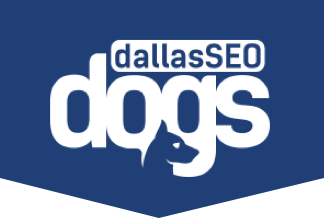Are You Over-Optimizing Your Website?

Last week on Twitter, Google’s John Mueller created a funny yet insightful post that compared modern search engine optimization (SEO) to the theme of the film Jurassic Park. In his post, Mueller said SEO is like Jurassic Park because, “Technically, you can do a lot of things, but should you?” While many brand owners focused on an SEO strategy may be ready to push forward and fast with every trick in the book, the truth is that over-optimization is possible; and it hurts! At Dallas SEO Dogs, we believe that SEO is a delicate dance that requires the right steps and finesse based on a website’s unique needs. Too little optimization is bad, but too much can be even worse. Let’s take a look at why over-optimization is an industry “no-no,” and how you can check to see if your site is failing because you’ve indulged in too much of a good thing.
Why is Over-Optimization Bad?
Back in the early days of SEO, over-optimization methods like keyword stuffing were an easy, yet messy way to get a website ranking well. Over time, search engine evolution has made searches more audience-focused. Therefore, pages that only focused on keyword stuffing and other over-optimization techniques suffered. Over-optimization creates a sloppy site experience that is hard to scan through and is extremely user-unfriendly. When your site is over-optimized, not only is it a prime target for search engine penalties, but users will quickly shy away and seek out competing sites that quickly give them the answers they need. All of these issues lead to the perfect storm that results in a website’s rankings plummeting, which harms the overall success of a brand.
5 Signs That You’re Site is Over-Optimized
The whole point of creating an SEO strategy is to boost your site to the top of local and national search engine rankings. While over-optimization is usually an honest mistake, it can still prevent you from meeting your strategic goals. To know if over-optimization is the reason for your lagging rankings, check out our top 5 red flags that signal the time to change up your strategy.
1. You’re Trying to Rank for Irrelevant Keywords
Your content should always focus on keywords that are relevant to a specific blog or page. Emphasizing keywords and long-tail phrases that you want to rank for but aren’t relevant to the topic at hand creates jumbled content that quickly turns readers away. Ranking for a few important keywords per page or post helps make your content flow smoothly and allows your audience to quickly realize that the content they click on in a search result is something that can help answer their essential questions.
2. You’ve Based Your URL on Keywords and Not Branding
Your site’s URL should always center around your specific brand. Although it may seem like a good idea to create a homepage URL that is chock full of keywords, search engines view this move as spammy and ding your site for keyword stuffing. Sure, if your brand name features necessary keywords, have at it; just try your best to completely stick with your brand when creating a site URL.
3. Too Many Anchor-Rich Links
Like your URLs, the internal links you use on your website should avoid making all anchor text keyword-dense or direct web addresses. Your link profile is one of the essential elements of your SEO portfolio. While anchor text that uses a keyword here or there isn’t a red flag to search engines, constantly doing this comes off as unnatural and could get your site flagged for spam. The best way to avoid directly keyword-rich anchor text is to sprinkle in keywords throughout long-tail phrases used in your content. Then, take that statement and use it as your link’s anchor text. This creates a natural flow in your SEO and won’t set off any warning alarms with search engines or audiences.
4. Your Linking Ignores Internal Pages
If most of your site’s links lead to your homepage, about us, or contact pages, you’re over-optimizing and completely ruining your linking profile. Whether you are pointing to internal or external links from your site, a healthy linking profile should sit with at least half of the links you create leading to internal pages that veer away from main navigation destinations.
5. You Are Writing for Bots
If you’re hyperfocused on squeezing every possible keyword across each of your page’s content you’re getting two things wrong:
- You are keyword stuffing and are on track for gaining a Google penalty
- You are completely ignoring Google’s push for natural, conversational content.
Modern audiences care about the content that connects on a personal level. If you’re writing for a bot, your content likely reads like a bot, and your audience will eventually move on to greener pastures. Conversational content that reads as a person speaks is still extremely SEO-friendly and is the type of content that converts. So, stray from trying to please Google and put the spotlight on pleasing your target audience.
How Can You Avoid Too Much Optimization?
Once you and your SEO team have gone through and corrected the over-optimization issues on your site, it’s easy to avoid the mistake in the future. Much like our last hint that you’re over-optimizing by writing for bots, keep in mind that your main focus should always be pleasing your target audience. Optimize your site for a user experience that:
- Is easily scannable
- Creates a personal, emotive experience
- Quickly educates, entertains, and converts
- Uses the right keywords organically to climb up in search engine rankings
With the right SEO team on your side, it’s easy to ensure that your site makes all of the right SEO decisions that help improve the user experience and your rankings.
Optimize Your Site to Perfection With Dallas SEO Dogs
If you’ve reviewed our post and realize that your site is guilty of too much optimization, it’s time to clean up the house and start climbing in search engine results page rankings. Dallas SEO Dogs is an experienced team of experts that can help you make your site search engine-friendly and a point of authority within your industry. From unique content creation to technical optimization, our team has your website covered! We’d love to meet you and find out more about how we can make your site an SEO powerhouse. Contact us today to schedule your free consultation!
